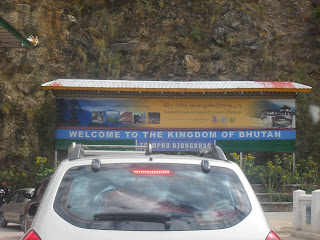Many travellers liken the experience of going to Bhutan to going back in time. With people walking around the city in their kiras and ghos, traditional style buildings and the relatively recent introduction of the internet and television - it's easy to understand how they come to this conclusion. But in other ways Bhutan seems to be far ahead of the rest of the world - for example, the government's admirable commitment to achieving Gross National Happiness (GNH).
The idea of GNH was proposed by the Fourth King, Jigme Singye Wangchuck, and is the basis of policy formation in Bhutan. Any policy that is put forward must be measured against the four pillars of GNH:
- sustainable development;
- preservation and promotion of cultural values;
- conservation of the environment;
- and good governance.
What is put forward in policy doesn't necessarily work perfectly in practice. But the fact that the goal of "happiness" rather than "wealth" is given so much attention puts Bhutan one ahead of the rest of the world.
Never was this more evident than during the recent global financial crisis, which completely changed the world's ideas about capitalism and provoked us to question our dependence on material wealth as a source of happiness. It was in this climate that the Prime Minister of Bhutan, Jigme Thinley, was asked to give the opening address at the 2010 World Leaders Forum. I was watching a replay of this on BBS last night. Thinley proposed "happiness" as the 9th Millenium Development Goal to which the audience responded with rapturous applause.
Not only is the Prime Minister an amazing orator, the speech also gives a fantastic introduction to the Kingdom of Bhutan and the farsighted philosophies that guide their public policy. Definitely worth a listen!
Some of the highlights:
On GNH:
“We are the only country so far that promotes happiness through deliberate public policy and action.”
“It is a goal that stands as a separate value while representing as well, the sum total outcome of the other eight. Its relevance goes beyond the poor and developing member states to bind all of humanity, rich and poor, to a timeless common vision.”
Commenting on the pursuit of military superiority:
“It is possible for us to realize that it is not security but insecurity we create by the spread of arms and the expansion of armies.”On the transition to democracy:
“The biggest challenge my country is faced with is how do you create democrats among a people who never wanted democracy in the first place.We’re faced with how to develop a democratic culture among the people so that the power they have can be exercised responsibly and effectively, so that even the most popular leaders—though they may have come through the electoral process—do not manifest tendencies and succeed in becoming authoritarian."On materialism:
"It does not demand much imagination intelligence, to understand that the endless pursuit of material growth in a world with limited natural resources, within a delicately balanced ecology is just not sustainable - that it is dangerous and stupid."
"As people rise above the threats of basic survival, what will our collective endeavour be as a progressive society? Must we continue to believe that human life is to be spent labouring for higher income so as to be able to consume more at the cost of relationships, peace and ecological stability? Are the causes of depression, suicide, community disintegration, and rising crime to be accepted as inevitable? Could we not find a way to steer ourselves from the self consuming fire of greed that is fuelled by the media and paid for by industry and commerce which thrive on reckless consumerism"
"One cannot imagine, even as China and India aspire to compete in consumption with the USA, what would become of earth if every global citizen acquired the same voracious capacity"
I wonder what the delegates from India and China made of this comment?


